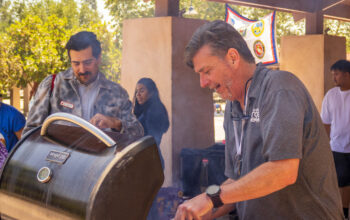Young adults have a hard time expressing themselves regarding their true gender. Sexuality is part of an emotional fulfillment and it is experienced in many ways, but as humans we share the same characteristics.
Pierce College’s Blatigenous club hosted a bisexual and pansexual awareness panel at the Great Hall on March 8.
Four guest speakers were present to share their stories and answer questions on topics like what it means to be bisexual and pansexual. They also discussed raising awareness about the different sexualities that exist.
According to guest speaker Wanda Vazquez, coming out is a frightening process.
“There’s this spectrum that a lot of people have a hard time understanding,” Vasquez said. “I’ve been in spaces where I’m holding my girlfriend’s hand and the family across me is shielding their children’s eyes.”
Vazquez said mainstream media is in a cycle of heteronormativity and doesn’t acknowledge the narratives of the LGBT community.
Guest speaker Rene Paredes talked about how she thinks people with different sexualities are being misunderstood and unrepresented by their surroundings.
“Gays are depicted on social media and television as super promiscuous if they’re portrayed or shown at all,” Paredes said.
The panelists shared advice with the audience and discussed what they have gained from sharing their stories with others.
“I think coming out is important for yourself,” Paredes said. “Try your best to find people and communities that identify as you or support you.”
Former Pierce College student Derrek McKeever was a guest panelist and shared his journey regarding his sexuality.
“For me, after coming out, I would never go back,” McKeever said. “Nothing compares to the joy of being yourself.”
Topics discussed by the panelists included how they realized they were bisexual or pansexual, how they came out and told their family and friends, what the hardest part of being bisexual or pansexual is and the outcome of coming out.



